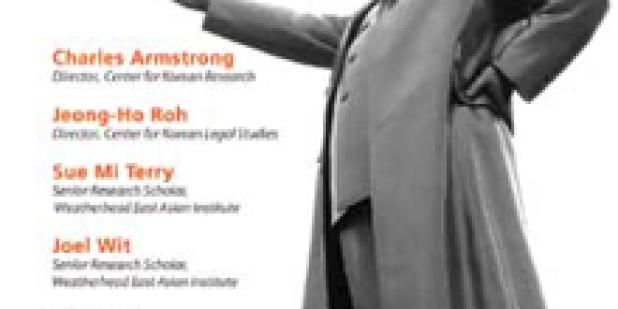Join us for a free one-day workshop for educators at the Japanese American National Museum, hosted by the USC U.S.-China Institute and the National Consortium for Teaching about Asia. This workshop will include a guided tour of the beloved exhibition Common Ground: The Heart of Community, slated to close permanently in January 2025. Following the tour, learn strategies for engaging students in the primary source artifacts, images, and documents found in JANM’s vast collection and discover classroom-ready resources to support teaching and learning about the Japanese American experience.
Leadership Succession in North Korea: Regional and Global Implications
The Weatherhead East Asian Institute and the Center for Korean Research invite you to a special roundtable discussion, featuring four Korea specialists' views on recent developments in North Korea.
Where

Speaker Bios
Charles Armstrong is a specialist in the modern history of Korea and East Asia. He has written or edited numerous books on modern and contemporary Korea, including The Koreas; The North Korean Revolution, 1945-1950; Korea at the Center: Dynamics of Regionalism in Northeast Asia; Korean Society: Civil Society, Democracy, and the State; and Tyranny of the Weak: North Korea and the World, 1950-1990 (forthcoming 2012). Armstrong teaches courses on Korean history, U.S.-East Asian relations, the Vietnam War, and approaches to international and global history. He is a frequent commentator in the U.S. and international media on Korean, East Asian, and Asian-American affairs. He received his BA from Yale, his MA from the London School of Economics, and his PhD from the University of Chicago.
Curtis J. Milhaupt is the Parker Professor of Comparative Corporate Law and Fuyo Professor of Japanese Law at Columbia Law School. He is also a member of Columbia University's Weatherhead East Asian Institute. Milhaupt's research and teaching interests include the legal systems of East Asia (particularly Japan), comparative corporate governance, and law and economic development. His research has been profiled frequently in The Economist and The Financial Times and has been widely translated. Milhaupt has been a member of several international project teams focused on major policy issues in Asia, including one charged with designing an "institutional blueprint" for a unified Korean peninsula. He holds a BA from the University of Notre Dame and a JD from Columbia Law School.
Jeong-Ho Roh is a recognized expert on North and South Korean legal relations. Specializing in the development of constitutionalism and democracy in both the South and North Korean legal systems, as well as U.S. and East Asian international transactions, Roh served as Legal Advisor to the Korean Ministry of National Unification on the KEDO North Korean Light Water Reactor Project and is a member of the Korean Ministry of Justice's New Round Legal Assistance Council. As Lecturer-in-Law at Columbia Law School, he teaches "Geopolitics of Law and Conflict on the Korean Peninsula" and "Korean Legal System in the Global Economy." He holds a BA from Seoul National University and a JD from Columbia, where he was Financial Editor for the Columbia Journal of Transnational Law.
Sue Mi Terry was a Senior Analyst for the Directorate of Intelligence at the Central Intelligence Agency (CIA) from 2001 to 2008. In 2008, Terry held the position of Director of Korea, Japan, and Oceanic Affairs at the National Security Council (NSC). Subsequently, Terry served as Deputy National Intelligence Officer for East Asia at the National Intelligence Council (NIC) in the Office of Director of National Intelligence (ODNI) from 2009 to 2010. In September 2010, she joined the Council on Foreign Relations (CFR) as the National Intelligence Fellow. Her research at the CFR included pressing issues in the Northeast Asian region, particularly Korean Peninsula affairs such as security policy, nuclear strategy, and domestic stability issues. Terry switched careers into the private sector in late 2011 and currently works as Managing Director at Gerson Global Advisors, a strategic investment and advisory firm based in New York. She holds an MA degree in International Relations and a PhD in International Relations from the Fletcher School of Law and Diplomacy, Tufts University.
Joel Wit was a key participant in the establishment of the Korean Peninsula Energy Development Organization (KEDO). Previously, Wit served as Senior Advisor to Ambassador Robert L. Galluci from 1993 to 1995, where he developed strategies to help resolve the crisis over North Korea's weapons program, and as Coordinator for the U.S.-North Korea Agreed Framework from 1995 to 1999, where he was the official in charge of implementation. Prior to his efforts on the Agreed Framework, Wit was assigned to the State Department's Office of Strategic Nuclear Policy, where he was responsible for U.S. policy on a range of issues related to nuclear arms control and weapons proliferation. Wit was a Guest Scholar at the Brookings Institute from 1999 to 2001, and is currently a Senior Fellow of the International Security Program, Center for Strategic and International Studies. He has published numerous articles on Northeast Asian security issues and is coauthor of Going Critical: The First North Korean Nuclear Crisis (Brookings Institution Press, 2004). Wit received his BA from Bucknell University and his MIA from Columbia University.
The discussion will be moderated by Curtis Milhaupt, Director of the Center for Japanese Legal Studies.
Registration is required and available here.
Featured Articles
Please join us for the Grad Mixer! Hosted by USC Annenberg Office of International Affairs, Enjoy food, drink and conversation with fellow students across USC Annenberg. Graduate students from any field are welcome to join, so it is a great opportunity to meet fellow students with IR/foreign policy-related research topics and interests.
RSVP link: https://forms.gle/1zer188RE9dCS6Ho6
Events
Hosted by USC Annenberg Office of International Affairs, enjoy food, drink and conversation with fellow international students.
Join us for an in-person conversation on Thursday, November 7th at 4pm with author David M. Lampton as he discusses his new book, Living U.S.-China Relations: From Cold War to Cold War. The book examines the history of U.S.-China relations across eight U.S. presidential administrations.




